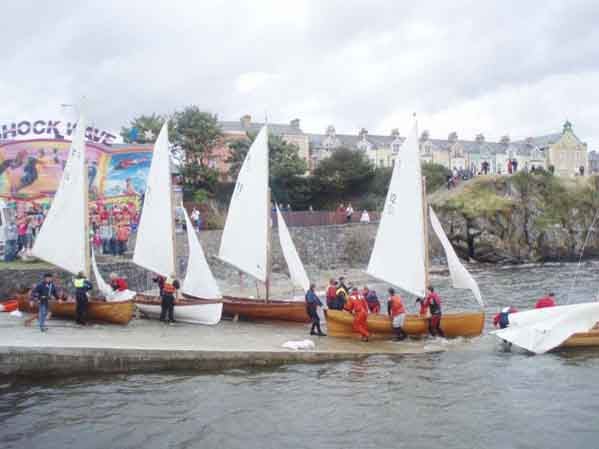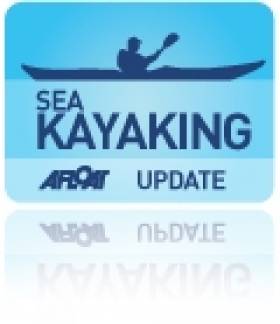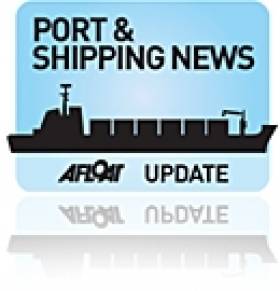Displaying items by tag: Inishowen
Inishowen Sea Kayak Symposium This Weekend
#SeaKayaking - The East Inishowen Sea Kayak Symposium takes place this weekend from 26-28 April.
Hosted by Just Kayak at the shorefront in Moville, Co Donegal, the weekend costs €130 for all coaching and guides, plus two nights self-catering bed and breakfast plus lunches and an evening meal.
Friday evening will feature a talk from Elaine 'Shooter' Alexander, discussing her epic circumnavigation of Ireland by sea kayak two years ago that we followed here on Afloat.ie.
Saturday will be a full day of coaching and guided trips around the Inishowen peninsula, followed by an evening of talks from guest coaches.
The final day on Sunday features a choice of different coaching sessions - and for something a little different, chef Brian McDermott will give a demonstration of outdoor cooking which might prove handy on your next kayaking trip.
For more details and booking info visit the Just Kayak website.
In other sea kayaking news, a Plymouth couple are hoping to be the first husband-and-wife team to kayak around the British and Irish coasts.
As The Herald in Plymouth reports, Andy and Jane Morton from Bere Alston left Plymouth aboard their double kayak Persey earlier this month beginning their five-month challenge for the RNLI and a local MS charity.
You can follow the couple's progress via their website HERE.
Body of Irish Fisherman Recovered in Scotland
#NEWS UPDATE - A fisherman whose body was found in a Scottish harbour on St Stephen's Day has been identified as that of a 34-year-old Donegal man, the Belfast Telegraph reports.
Philip Anthony Toland, from Glengad in Inishowen, Co Donegal, was last seen on Christmas Day near the pier at Ullapool harbour in the Scottish Highlands.
As BBC News reports, concerns were raised later that evening and a search was launched involving police, coastguard and RNLI lifeboat teams.
The body was located by a police dive team in the sea near the pier when the search resumed on Monday morning.
It is being speculated that Toland - who has an eight-year-old son - may have slipped and fallen into the water while returning to his boat.
Donegal Ferry Services Under Review
The cross-border service is funded by Donegal County Council and Limavady Borough Council. The route in recent years has experienced an unfavourable exchange rate, increased cost of fuel, poor weather, a depressed tourism market sector and notably reduced construction traffic, contributing to a sharp decline in demand. In the current climate the local authorities may find it difficult to provide funding as they scale back on budgets.
Record levels in 2005/2006 saw traffic reach 106,179 vehicles and 302,740 passengers. Such was the success of the service annual subsidies for 2008 and 2009 were not required. According to the latest 12-monthly traffic figures for June 2009-June 2010, vehicle volumes dropped to 52,669 and passengers levels have decreased more than halve to 149,455.
The 10-minute route is operated by the 44-vehicle capacity Foyle Venture which served the Kilimer-Tarbert route for the Shannon Ferry Co. The mid-west estuary ferry was replaced by newbuild Shannon Breeze in 2000 and later sold to Lough Foyle Ferry Co.
When the Lough Foyle route began operations in 2002, the service received a subvention of €108,000 each from the local councils. Over that timeframe, the route has received a total funding of €500,000 from Donegal County Council.
In 2009, the two local authorities agreed to provide a €200,000 subvention, but this runs out in March 2011. An application has also been submitted to the Special EU Programmes Body for funding.
On the west side of the Inishowen Peninsula is the Bunbcrana-Rathmullan service, which is also in doubt if a subsidy from Donegal County Council cannot be maintained. The Lough Swilly route started in 2004 and is served by the 20-vehicle capacity Foyle Rambler, a former German river-ferry. The north-west ferry route takes 25-minutes and recorded 15,000 passengers at its peak.
In busier times, tourists from the North, instead of passing through Derry city, used the 'land-bridge' routes across the Inishowen Peninsula to reach holiday-homes and popular seaside resorts throughout Co. Donegal.
Moville Boat Club

Picture from Moville and Greencastle Punt Regattas 2009
Moville Boat Club
Based in Moville, Inishowen, Co Donegal, Moville Boat Club members count themselves as some of the luckiest sailors in the World. We sail on one of the most beautiful loughs in Ireland. Each Sunday we gather to race in a friendly and relaxed atmosphere. Not to say we are not competitive, but mostly in a friendly way. The ethos of the club is to encourage sailing and boating on Lough Foyle at a price which anyone can afford. There is plenty of room for new members. Visiting boats are most welcome and there are a number of visitor moorings available.
(Details and image courtesy of Moveille Boat Club)
Moville Boat Club c/o Seamus Bovaird, Johns Brae, Shore Green, Greencastle, Co Donegal. Email: [email protected] or [email protected]
Have we got your club details? Click here to get involved
































































